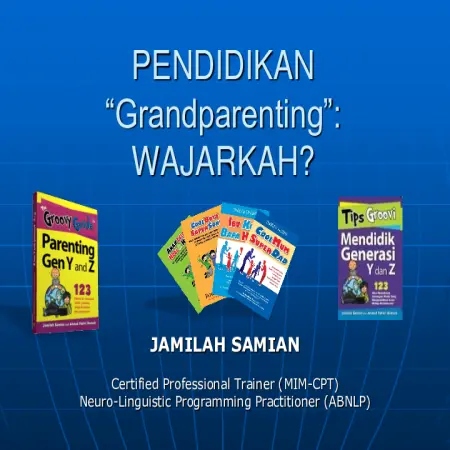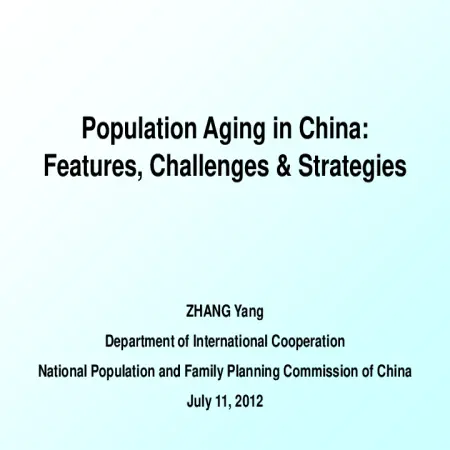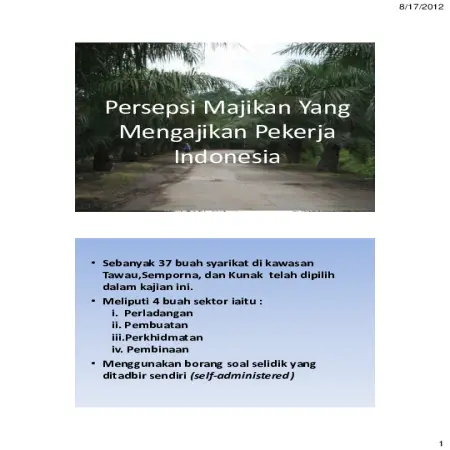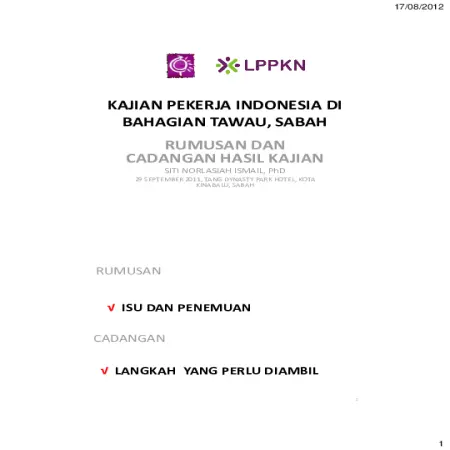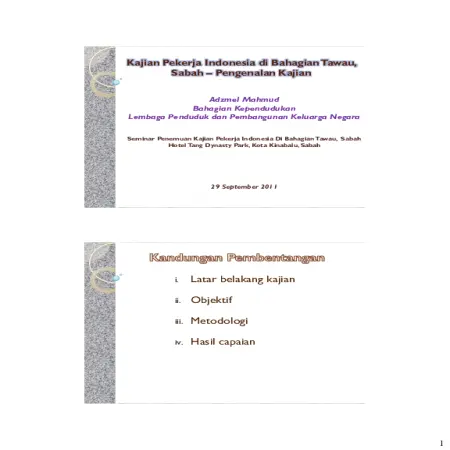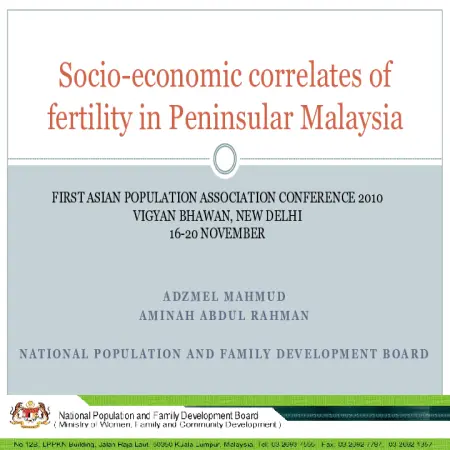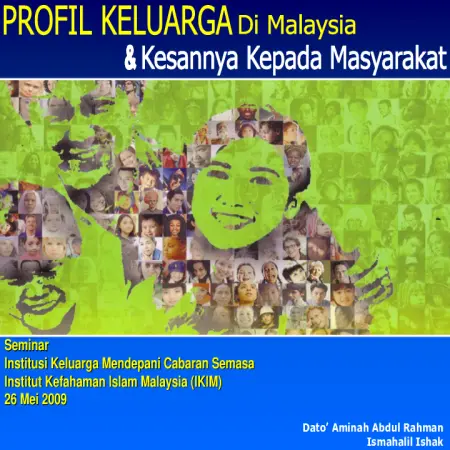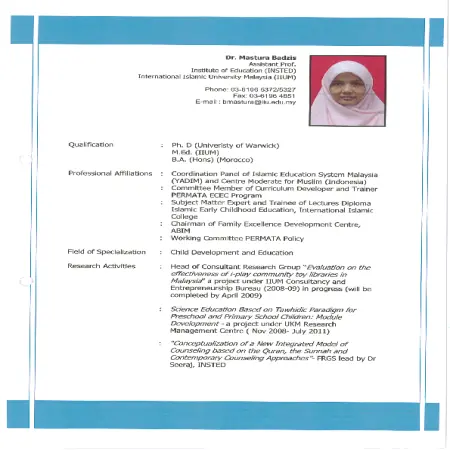Browse by Type
Results for Item type : "Conference or Workshop Item"
|
|
Population aging in China: features, challenges & strategies
Item Type: Conference or Workshop Item
Editor:
Year: 00/00/2012
Abstract: Global response to population aging is confronted by a series of severe challenges, for example retirement and medical/caring costs adds to fiscal burdens, population aging withers the labor force, development and aging problems intermingle as growth of the aged population mostly takes place in developing countries and poverty of the aged remains an acute problem. All these issues may only be addressed when national governments all over the world take the needs of the aged into full consideration in developing their social policies, establish specific strategies for responding to population aging and incorporate such strategies into long-term national development frameworks. Population aging also reflects the progress and achievement that the human society has made in extending life expectancy, improving mother and child health and helping women realize family planning. Seniors are more than just beneficiaries of social welfare. As producers, consumers, spreaders of traditional cultures, care-takers of children in their families and communities, seniors also play positive irreplaceable roles. A shared goal for us all therefore is to regard aging as an achievement, respond to age-related issues with a positive, optimistic and rational altitude, view skills, experiences and resources of the elderly as capital of the social development course, incorporate aging into our development agendas, promote positive aging and thereby construct a sharing society regardless of age.
|
|
|
|
|
|
Indonesian labour migration to Sabah: causes and implications
Item Type: Conference or Workshop Item
Editor:
Year: 01/07/2011
Abstract: There is increasing interest among policymakers and researchers in the relationship between migration and development in low and middle income countries (United Nations, 2006). However, there remains a lack of empirical evidence on the impact of migration on economies of origin and destination, especially in Asia and Africa. This paper reports on one of the most substantial global migration corridors (World Bank, 2011) – that linking Indonesia and Malaysia. In 2009 it is estimated that migrants in Malaysia numbered 2 million, around a half of whom were Indonesians. It is based predominantly on a substantial survey of Indonesian labour migrants working in the East Malaysian state of Sabah undertaken in 2010. The paper begins with a brief discussion of contemporary thinking on the relationship between migration and development as a basis for examining the situation in Sabah. Some key features of the movement between Indonesia and Malaysia, especially that directed to Sabah, are then discussed. The economic contribution of Indonesian migrant workers is first examined in Sabah and then in the home areas of the Indonesian migrant workers. The paper then discusses the policy implications of these findings, especially in the Malaysian context.
|
|
|
|
|
|
Persepsi penduduk tempatan terhadap kehadiran pekerja Indonesia di Bahagian Tawau, Sabah
Item Type: Conference or Workshop Item
Editor:
Year: 00/00/2011
Abstract: A total of 37 companies in Tawau, Semporna and Kunak were selected in this study which covers 4 sectors namely plantation, manufacturing, services and construction. This study uses a self-administered questionnaire. The majority of employers in all sectors were found to provide facilities and welfare such as accommodation (employees only), health and medical treatment facilities and insurance to their Indonesian employees. More than 80.0 percent of employers in all sectors fully fund facilities and welfare such as workers' insurance (94.4%), treatment and health facilities for workers with family members (88.6%), and shelter for workers (82.4%). This presentation slide describes the perception of employers who employ Indonesian workers.
|
|
|
|
|
|
Kajian pekerja Indonesia di Bahagian Tawau, Sabah: rumusan dan cadangan hasil kajian
Item Type: Conference or Workshop Item
Editor:
Year: 00/00/2011
Abstract: There are several factors for the entry of Indonesian workers to Sabah, among them is finding a job, earn a higher income as well as proximity to the country of origin. Recommendations and measures to be taken are to improve the enforcement of existing policies and laws, for example not being allowed to bring family members for unskilled and semi-skilled workers, prompt repatriation for foreign workers staying beyond the period (5 years) and employers bearing the cost of delivery come back. The next step is to curb the entry of illegal workers or immigrants, especially through illegal entrances (border control). Employers need to give priority to locals to work by giving higher wage rates or salaries. The government needs to set a minimum wage in every employment sector and plan workforce requirements updated. The government needs to encourage employers to move to mechanization and automation, especially for the plantation sector to reduce dependence on labor (unskilled and semi -skilled). Lastly, government should provide guidelines for the residence of foreign workers and facilities in the workplace as well as undergo regular monitoring by relevant agencies, and also encourage socialization with local residents. This presentation slide will describe the issues and suggestions that need to be taken as a result of the study of Indonesian workers in the Tawau Division, Sabah.
|
|
|
|
|
|
Kajian pekerja Indonesia di Bahagian Tawau, Sabah: pengenalan kajian
Item Type: Conference or Workshop Item
Editor:
Year: 00/00/2011
Abstract: The objective of this study is to identify the causal factors of entry and conduct socio-demographic analysis such as family, education, health, family planning practices, citizenship and socialization of Indonesian immigrants. The next objective is to study the perception of dependence on Indonesian workers as well as the impact of the presence of immigrants/Indonesian workers on the local population in terms of economy, security, family, culture, education, health, social and legal. The last objective is to identify the factors of hiring foreign workers, the process and costs of hiring, wages and employment, and the facilities provided by employers to foreign workers.
|
|
|
|
|
|
Socio-economic correlates of fertility in Peninsular Malaysia
Item Type: Conference or Workshop Item
Editor:
Year: 00/00/2010
Abstract: To examine fertility trends and differentials among women in Peninsular Malaysia by selected socioeconomic variables which significantly influence the number of children ever born. A total of 3,697 ever-married women aged 15-49 were successfully interviewed in Peninsular Malaysia.
|
|
|
|
|
|
Profil keluarga di Malaysia & kesannya kepada masyarakat
Item Type: Conference or Workshop Item
Editor:
Year: 00/00/2009
Abstract: Family institution in Malaysia is facing many changes and challenges. Functional families and the role of institutions is crucial to the development of human capital formation, human and potential development of each family members and influence the development and well-being of the people. Formation patterns and family relationships as well as family lifestyle can be seen in the demographic trends in Malaysia. Formation and family structure that encountered evolution has influenced some aspects of family life. Now family institutions are required to be more resilient in dealing with the challenges of life such as child care, dual-career couples, financial management, parenting teens and responsibilities to elderly parents.
|
|
|
|
|
|
Penduduk dan keluarga: penemuan Kajian Penduduk dan Keluarga Keempat
Item Type: Conference or Workshop Item
Editor:
Year: 00/00/2009
Abstract: This paper discusses the important findings of the Fourth Population and Family Survey conducted by NPFDB in 2004. This study is the fourth in a series of Malaysian Population and Family Survey (MPFS) conducted every ten years since 1974. In 2004, this study was for the first time conducted simultaneously for the whole of Malaysia. In contrast to the previous MPFS, MPFS-4 interviewed households consisting of five (5) categories, (a) Women aged 15 to 49 years, (b) Husbands of married women, (c) Adolescents aged 13 to 24 years, (d) Citizens aged 50 years and above, and (e) single residents aged 25 to 49 years. This study aims to provide time series data related to demographic and socio-economic information in particular the relationship between population, family and human reproduction with development. The results of the study are used to evaluate the effectiveness of existing development programs and also used as input in the preparation of the Ninth Malaysia Plan (9MP). In this study data analysis was performed for the three areas separately. Among the important findings include: 1) Age structure of the population, 2) burden of dependents, 3) Delayed marriages, 4) Fertility, 5) Family planning, 6) Health practices, 7) Household composition, 8) Female labor force participation, 9) Child care, 10) The elderly, and 11) Adolescent social and sexual behavior.
|
|
|
|
|
|
Families resilience and children and families of low income: maximizing opportunities through PERMATA ECEC Program
Item Type: Conference or Workshop Item
Editor:
Year: 00/00/2009
Abstract: PERMATA Early Childhood Education and Care (ECEC) Program in Malaysia was launched on the basis of evidence from research and practice which illustrates that early intervention through high quality program enhances children's social, emotional, spiritual, physical, and cognitive development. PERMATA is a child-focused, community integrated program with the overall goal of increasing school readiness in young children in low-income families, particularly in deprived areas. Despite its various learning outcomes, ECEC main underpinning goal is to produce generations of youth who are able to manage and regulate emotion, possess high EQ skill, and resillient in facing different challenges in life. Its long-term effect can be better understood as children develop into responsible citizens who will take a much more positive role in the society and are free of social ills that now seem to beset the country. This paper presents some strategies of best practices that have been applied in this program to foster and instill resilience in children mainly, increasing caring relationship, developing social competence, encouraging, self-help skills, create partnerships with family and community, and awareness of the existence and supremacy of God.
|
|
|
|





